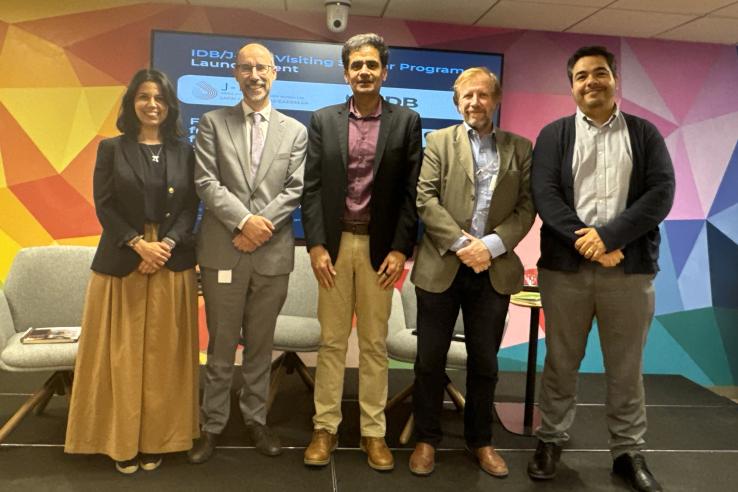The Inter-American Development Bank and J-PAL LAC Launch Collaborative Visiting Program to Foster Evidence-Based Policy in Latin America and the Caribbean

A collaborative effort between IDB and J-PAL LAC to foster regional policy innovation through rigorous research and knowledge exchange.
The Inter-American Development Bank (IDB) and the Abdul Latif Jameel Poverty Action Lab Latin America and the Caribbean (J-PAL LAC) have officially launched a new Visiting Researcher Program, marking a new phase in the strategic collaboration between the two entities. This program aims to enhance how the IDB integrates research and evidence into its policymaking processes to address critical challenges in the region. The launch event took place on October 21 at IDB’s headquarters in Washington, DC.
A long-term, structured partnership
In a world where development challenges are increasingly complex, evidence-based policies are essential to driving effective solutions. The Visiting Researcher Program embeds researchers from the J-PAL network in IDB units to foster closer collaboration, ensuring that insights are not just generated but also used to inform real-world policy decisions in areas prioritized by IDB.
The first cycle of the program focuses on the enforcement of government initiatives, health and elderly care, energy and climate change, citizen security and justice, and ensuring an equitable transition to a low-carbon economy. Researchers for this program cycle will include Pablo Celhay for elderly care, Guillermo Cruces for government enforcement, Micaela Sviatschi for justice, Jeanne Lafortune and José Tessada for energy and climate change, and Thomas Fujiwara for just transition.
This effort builds on years of collaboration between IDB and J-PAL LAC, reinforcing their ongoing commitment to making rigorous evidence part of everyday decision-making. The organizations have a history of working together to promote research. For instance, IDB is one of the donors of J-PAL’s Jobs and Opportunities Initiative (JOI) Brazil, which has seventeen funded projects and has produced several evidence summaries. The Visiting Researcher Program brings this partnership one step further, officially establishing a continuous framework for deeper engagement between IDB and academics, particularly in emerging areas like climate change.
Event highlights
The launch event brought together key figures from IDB and J-PAL to discuss the significance of the collaboration and its potential impact on policy development in LAC. Ana María Ibañez, vice president for sectors and knowledge at IDB, emphasized the bank’s commitment to evidence-based policymaking: "We are in the process of redefining IDB as a knowledge institution."
Speaking at the event, Iqbal Dhaliwal, global executive director of J-PAL noted that, “While our visiting scholars are at the heart of this program, it is equally about institutionalizing a partnership with IDB that brings the expertise of our professional staff including sector and regional specialists to work closely with both the scholars, and with our colleagues at IDB to greatly increase the pathways from rigorous research to policy and scale in LAC countries."
Finally, there was a closing panel where Mariano Bosch, principal economist and pensions coordinator at IDB’s Labor Market and Social Security Unit, Paula Pedro, executive director of J-PAL LAC, and J-PAL affiliated professor Francisco Gallego, professor at Pontificia Universidad Católica de Chile and co-scientific director of J-PAL LAC.
Paula Pedro's presentation summarized that "the movement from research to policy is important, but not easy" and that the Visiting Researcher Program "can help us find ways to lower internal and external costs for people to generate and use evidence."
Francisco Gallego supported this view, adding that the program is something new: "We [J-PAL] have a lot of knowledge to share, not just on the academic part, but also ideas on how to move from evidence to policy, on how to disseminate, and on how to do training. This is a project with a lot of potential."
Bringing in the IDB's perspective, Mariano Bosch noted that the "2024–2025 cycle will be about getting the program started and seeing what works and what doesn't work," with 2025 focused on improvement and knowledge sharing.
The event provided a platform for IDB and J-PAL staff to share their experiences, highlight the partnership, and discuss future plans for the program. Attendees were able to engage in a lively discussion on the importance of evidence-based policymaking and how the Visiting Researcher Program will serve as a key vehicle for advancing these efforts.
Following the event Ana Maria shared that “evidence can be used to change policies in ways that help countries achieve their goals in climate change, poverty and inequality reduction, and attaining sustainable economic growth that generates more jobs and wellbeing. But it all starts with having evidence of what works and in what contexts.”
Looking ahead
The Visiting Researcher Program is set to begin with two pilot residencies in 2024. It will then scale up to four to six researchers annually in the following years. This is not just an exchange of ideas; it’s about inputting evidence into policymaking and exploring how it can reshape programs to better meet the needs of the LAC region. As this collaboration evolves, both IDB and J-PAL LAC aim to ensure that research becomes central to how policies are designed, implemented, and scaled.